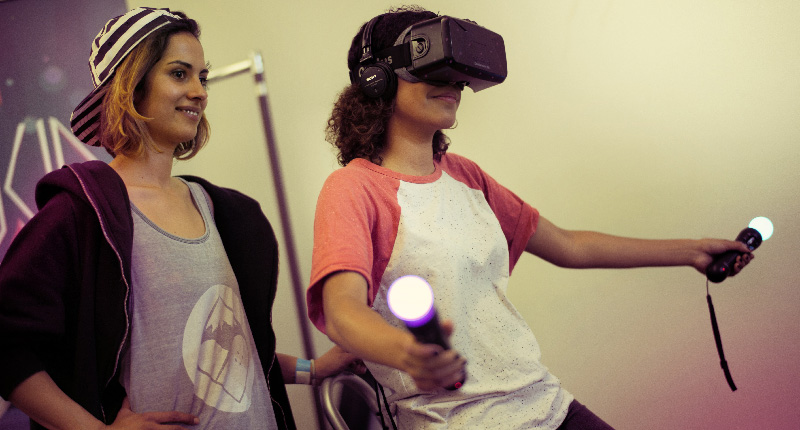Lucid Trips is a virtual reality (VR) game that, as its name suggests, is inspired by the mysterious and magical practice of lucid dreaming.
It places you in a bodiless avatar that allows you to explore various vibrant and surrealistic planets in a large “VR dream universe”. The creators (all members of the German VR Collective) describe it as a “Virtual Reality geo-caching experience”.
No ad to show here.
A few days ago (19 June) they announced their new art exploration game concept that takes place on their first dream planet dubbed Whateverland, an ethereal fusion that brings the world of art and lucid dreaming together.
But before we travel to Whateverland, let us quickly take a brief look at how Lucid Trips works.
The Lucid Trips Experience
To start off, you will of course be using a VR kit. Currently the creators, namely Sara Vogl, Nico Uthe and Mo Li, are targeting platforms such as the “HTC Vive, Oculus Rift, Sony Project Morpheus, etc.”
Once you enter the world of Lucid Trips you, the player, will navigate the environment via two floating arms. With these two ghostly limbs you will be able to run, grab and hold, jump around, swim and even experience one of lucid dreaming most coveted activities, flying.
These movements are controlled via two PlayStation Move controllers that effectively translate your motions into game play. This immersive method of interactivity, known as haptic feedback, is also what sets Lucid Trips apart from many other current VR experiences where you still navigate the digital reality via standard console controllers.
And moving on to Whateverland
At its core, Whateverland can be described as a virtual art gallery, allowing its users to explore a large dream world filled with various 3D artworks. Because of the wide range of movements at your disposal like flying and climbing, you will be able to view these artworks from a great variety of perspectives.
“As Lucid Trips is a dreamuniverse where people can slip into the dreamworlds of other people, we first wanted to make art visible from these completely new dimensions and perspectives that are possible through the medium of virtual reality,” Vogl explained to Motherboard.
“An inspiration for us was Rolf Bergheimer, who did an installation about three years ago – before the Oculus Rift came out – where he 3D-scanned a piece of art and made it visible in virtual reality”.
But where the fun of exploration ends, the fun of creation begins. Whateverland will provide artists with the opportunity to add their own artworks to this digital wonderland.
Read more: Fancy the Oculus Rift? You’ll need one beefy PC to drive it
3D artists can simply send over their digital 3D models to be integrated into Whateverland while analogue artists (such as sculptors) can have their artworks 3D scanned so that it can be transferred to the dream world. Each piece of art will also offer unique sets of interactions based on the artist’s intentions and concepts.
Vogl also explains that if 3D works aren’t your thing then Whateverland will also dabble in other creative mediums and disciplines such as sound- or code-art.
Another great aspect of this concept is that even though anybody can submit their work to Whateverland, it is Vogl (the digital gallery’s curator) that will have the final say on which artworks are featured on the dream planet.
This way you know that whenever you are visiting Whateverland you will always be met with a digestible range of high quality pieces.
If you discover any works you are particularly fond of while on your digital exploration trip, you will be able to purchase it as a 3D print. But before a work is “set free” you must first solve a riddle based on the artist’s intentions.
The works that are currently featured in Whateverland are all from established German artist such as Painter Neo Rauch, Graffiti artist Diam and the before mentioned Rolf Bergmeier.
“We also want to feature art that is specifically created for the medium of virtual reailty and has some tweaks that blow our minds,” says Vogel.
Lucid Trips and Whateverland are one of the most exciting and innovative concepts I have heard of in a long time. In comparison to other VR projects, from what I’ve heard and read so far it sounds like it is going to be a totally unique VR experience that will push the boundaries of the medium and lay a strong foundation for others to build upon.
As of yet there doesn’t seem to be a release date but Vogl has this to say:
Lucid Trips is a self-financed project. To make the most sophisticated first gaming planet, the team is running a kickstarter campaign later this year. When consumer version of suitable devices are out there will be a downloadable demo.
